People > Death of Alexander the Great
Death of Alexander the Great
Background
The death of Alexander III the Great came as a sudden and surprise shock to pretty much everyone. According to ancient Babylonian texts recovered, Alexander the Great died at some point in the evening of June 10th and the morning of June 11th in 323 BCE in the city of Babylon.
His death according to the sources occurred after visiting the fabled Hanging Gardens of Babylon one last time and apparently happened in the grand palace of Nebuchadnezzar II. No one knows what really caused his sudden and unexpected death at such an early age and conspiracy theories popped up all across the empire in the days and weeks following his death.
While some view Alexander's death as straight forward, there are many different theories on why this may not be such a cut and dry incident. Another fact that hinders investigation is that fact that no one has been able to find Tomb of Alexander the Great in order to perform a modern forensic analysis on his body.
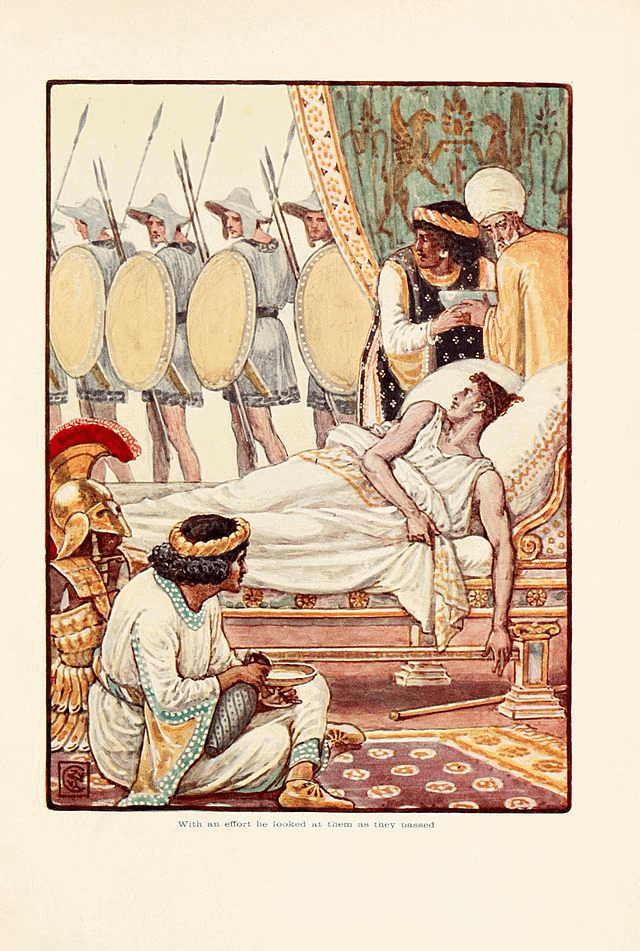
Dying Alexander the Great - Walter Crane: The Story of Greece
Alexanders premature death sent massive shockwaves throughout his fledgling empire and many of his generals would struggle to retain control over the vast territory that they had conquered. In the end the empire that Alexander had built would break into various factions that all vied for regional supremacy through a series of conflicts known as the Wars of the Diadochi.
These wars resulted in Alexander's generals and successors known as the diadochi to seize various portions of the empire and establish their own kingdoms by fighting among each other. Ultimately it would lead to the establishment of a new dynasty in Egypt under Ptolemy I, the Seleucid Empire under Seleucus I, and control over Macedon, Thrace and by Cassander.
Unfortunately if these people had stuck together and firmly established the idea that Alexander had truly envisioned then maybe it would have lasted. But all of the internal strife between Alexander's successors caused the fragmentation of the empire and led it to be eventually conquered by the Roman Republic and the Parthian Empire.
Final Years
Alexander began to march towards Babylon in 324 BCE after ending his military campaign throughout the vanquished Achaemenid Empire and managed to get as far as the Tigris River before he was greeted by the Chaldean priests that represented the religion of Babylonia. They warned Alexander that they had spoken to their god Bel and he had warned that Alexander entering Babylon would prove fatal for him.
According to the religion of the Chaldeans they warned that marching westwards into Babylon meant he was looking towards the setting sun, and ultimately a period of decline. The Chaldeans wanted him to enter Babylon through the east, towards the rising sun. However, Alexander in his attempt to encircle Babylon before he entered was met with unfavorable terrain. Around October 21 or 22 of the year 331 BCE, Alexander entered Babylon and was taken in awe with what he saw once again.
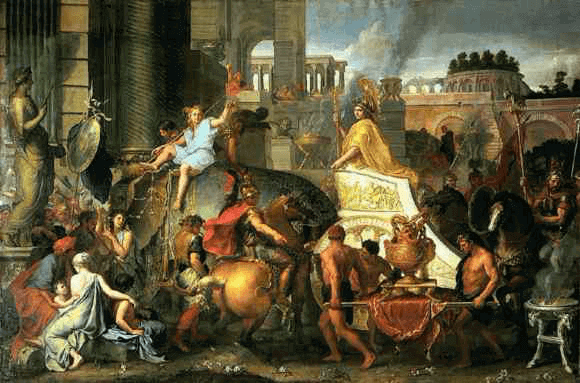
Alexander in Babylon - Charles le Brun (1665)
Except this time the military began to settle down and enjoy the fruits of their long and hard labor. The original Macedonian soldiers that survived the entire campaign were to enjoy the fruits of Babylon or return home if they wished. Soon however, Alexander began planning another military conquest of Arabia which would have most likely concerned his generals and officers. They were already tired of battle long before the conquest of India and they wished to enjoy the peace and prosperity of the largest empire in ancient history to date.
But Alexander was not an idle body and during his last days he was in the process of making a navy ready to sail and readying the troops for the campaign to acquire the vast desert and caravan routes of Arabia. If he was murdered by one of his companions this upcoming campaign would prove the motive to do so. This is strongly suggested in Oliver Stone's movie, Alexander.
So in attempting to understand the mystery of the sudden and unexpected death of Alexander the Great we need to look at his entire life, especially the last years and final days for any clues or context as to if this could have been a conspiracy among his generals and officers or if this was due to a tropical disease or possibly alcohol poisoning. Until we recover the tomb of Alexander the Great we may never know what truly killed him. However, if this discovery were to occur it may be possible that modern forensics would be able to determine this.
Final Days
Moving on to Babylon, Alexander was met by Mazaeus, who had taken refuge in the city after the battle [of Gaugamela]. He came as a suppliant with his grown-up children to surrender himself and the city. Alexander was pleased at his coming, for besieging so well-fortified a city would have been an arduous task and, besides, since he was an eminent man and a good soldier who had also won distinction in the recent battle, Mazaeus' example was likely to induce the others to surrender.
Accordingly Alexander gave him and his children a courteous welcome. Nevertheless, he put himself at the head of his column, which he formed into a square, and ordered his men to advance into the city as if they were going into battle.
A large number of the Babylonians had taken up a position on the walls, eager to have a view of their new king, but most went out to meet him, including the man in charge of the citadel and royal treasury, Bagophanes. Not to be outdone by Mazaeus in paying his respects to Alexander, Bagophanes had carpeted the whole road with flowers and garlands and set up at intervals on both sides silver altars heaped not just with frankincense but with all manner of perfumes . Following him were his gifts - herds of cattle and horses, and lions, too, and leopards, carried along in cages.
Next came the Magians chanting a song in their native fashion, and behind them were the Chaldaeans , then the Babylonians, represented not only by priests but also by musicians equipped with their national instrument. (The role of the latter was to sing the praises of the Persian kings, that of the Chaldaeans to reveal astronomical movements and regular seasonal changes.) At the rear came the Babylonian cavalry, their equipment and that of the horses suggesting extravagance rather than majesty.
Surrounded by an armed guard, the king instructed the townspeople to follow at the rear of his infantry; then he entered the city on a chariot and went into the palace. The next day he made an inspection of Darius' furniture and all his treasure, but it was the city itself, with its beauty and antiquity, that commanded the attention not only of the king, but of all the Macedonians.
And with justification. Founded by [the legendary queen] Semiramis [...], its wall is constructed of small baked bricks and is cemented together with bitumen. The wall is ten meters wide and it is said that two chariots meeting on it can safely pass each other. Its height is twenty-five meters and its towers stand three meters higher again. The circumference of the whole work is 365 stades, each stade, according to the traditional account, being completed in a single day.
The buildings of the city are not contiguous to the walls but are about thirty meter's width from them, and even the city area is not completely built up -the inhabited sector covers only 275 hectares- nor do the buildings form a continuous mass, presumably because scattering them in different locations seemed safer. The rest of the land is sown and cultivated so that, in the event of attack from outside, the besieged could be supplied with produce from the soil of the city itself.
The Euphrates passes through the city, its flow confined by great embankments. Large as these structures are, behind all of them are huge pits sunk deep in the ground to take water of the river when in spate, for when its level has exceeded the top of the embankment, the flood would sweep away city buildings if there were no drain shafts and cisterns to siphon it off. These are constructed of baked brick, the entire work cemented with bitumen.
The two parts of the city are connected by a stone bridge over the river, and this is also reckoned among the wonders of the East. For the Euphrates carries along with it a thick layer of mud and, even after digging this out to a great depth to lay the foundations, one can hardly find a solid base for a supporting structure. Moreover, there is a continuous build-up of sand which gathers around the piles supporting the bridge, impeding the flow of water, and this constriction makes the river smash against the bridge with greater violence than if it had an unimpeded passage.
The Babylonians also have a citadel 3,7 kilometers in circumference. The foundations of its turrets are sunk ten meters into the ground and the fortifications rise 24 meters above it at the highest point. On its summit are the Hanging Gardens, a wonder celebrated by the fables of the Greeks. They are as high as the top of the walls and owe their charm to the shade of many trees. The columns supporting the whole edifice are built of rock, and on top of them is a flat surface of squared stones strong enough to bear the deep layer of earth placed upon it and the water used for irrigating it.
Prophecy of Calanus
Calanus was likely to be a Hindu Naga sadhu, whom Greeks called gymnosophists. He had accompanied the Greek army back from Punjab, upon request by Alexander. He was seventy-three years of age at that time. However, when Persian weather and travel fatigue weakened him, he informed Alexander that he would rather die than live disabled. He decided to take away his life by self-immolation. Although Alexander tried to desist him from doing so but upon the insistence of Calanus, Alexander relented and the job of building a pyre was entrusted to Ptolemy. The place where this incident took place was Susa in the year 323 B.C. Calanus is mentioned also by Alexander's admiral, Nearchus and Chares of Mytilene. He did not flinch as he burnt to the astonishment of those who watched. Before, immolating himself alive on the pyre, his last words to Alexander were "We shall meet in Babylon". Thus he is said to have prophesied the death of Alexander in Babylon. At the time of the death of Calanus, Alexander, however, did not have any plan to go to Babylon. No one understood the meaning of his words "We shall meet in Babylon". It was only after Alexander fell sick and died in Babylon, that the Greeks came to realize what Calanus intended to convey.
Final Days
In order to determine accurately how Alexander died we need to understand when, where and for how long he was sick for. This well help us determine what may be the culprit behind his death weather it is human or bacterial.
According to the records available, Alexander was sitting down for dinner with his friends in the palace of Nebuchadnezzar II and was drinking and celebrating their victories far into the night. When Alexander went up to leave he encountered a close friend Medius. Encouraging him to continue drinking, Alexander and obliged. Following the Royal Diaries, Alexander drank more with Medius before going to take a bath and slept. The next day he ate dinner with his friends and drank late into the night. However, by now he had already begun to have a fever so Alexander took a bath, ate and went to sleep.
The next morning he woke up quite ill and had to be carried out of his bed to perform the daily religious rituals. After the daily religious ceremonies, Alexander lay in bed for many hours. Even while sick Alexander left standing orders for his army to prepare to march within a few days. Alexander was planning on marching into Arabia, a land of rich trade from incense.
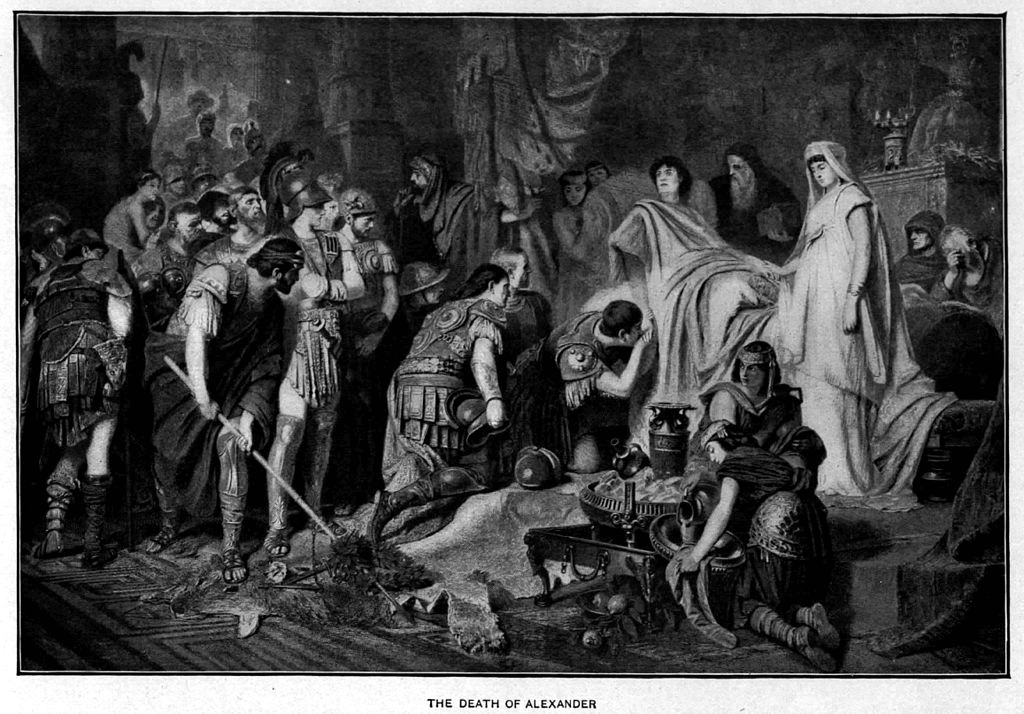
Death of Alexander the Great - Karl von Piloty (1886)
After arranging his military strategy he was carried from his bed to the Euphrates River where he crossed in a boat to the other side. He took a bath and slept some more. Still stricken with the fever, he awoke the next day to perform the religious sacrifices and he went to lie down. He gave orders to Medius to arrange for all officers to report to him directly the next morning. Alexander ate a little more and then went to his room, still complaining of the fever.
When he awoke the next morning he bathed and did the normal ritual sacrifices as usual. After that he issued orders to his admiral Nearchus that the voyage to Arabia was to begin in two days. He bathed again, did more religious rituals and was in an even worse state than before.
That night his condition turned even worse and he was moved closer to the bath. Despite his worsening condition, Alexander still sent orders to all his officers to continue planning the military expedition. Another day passed and he just barely managed to issue the religious rituals of the day. The following day he was horribly ill yet still refused to neglect his duties. He gave orders that all of his senior officers should wait in the court and the military commanders outside his door.
Near Death
His condition was turning increasingly desperate and this would spell the end for Alexander. He was able to recognize the officers when they approached his room but he was no longer able to speak to them at this point. From this point on Alexander was unable to talk. Over the course of that night, the following day and the day after Alexander remained.
It is recorded that all the soldiers were eager to see him, either dead or alive and many had believed he already died and they were covering it up. According to the reports he was able to recognize each soldier that passed by but was unable to talk for he was on the brink of death.
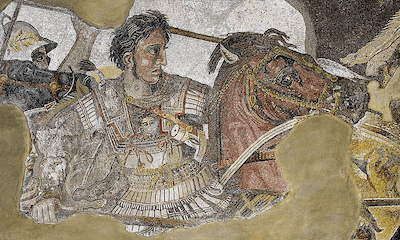
Alexander the Great Mosaic
According to the Royal Diaries, a great number of Alexander's friends and generals including Peitho, Attalus, Demophon, Peucestas, Cleomenes, Menidas and Seleucus spent the night in the Temple of Serapis and prayed for his survival. However, intervention from the gods was not forthcoming and Alexander perished that night.
It is believed by some that he named his successor as "the best man" and that he knew there would be fighting for power after his death. This exact thing occurred and upon Alexander's death his empire was thrown into chaos.
Theories of Death
It is not hard to believe that a great number of people would want Alexander dead. He conquered and razed some of the greatest civilizations the world had ever seen. His own men were even getting tired of constant military campaigns and this view could have extended to his top generals.
At the point of his death Alexander had been waging military campaign after military campaign for the better part of his life. It is not hard to believe some people saw his death as an opportunity to claim a chunk of this empire as their own.
Here we attempt to dissect each theory of death for Alexander the Great in order to determine the most plausible given the evidence.
Assassination
There are some believe that Alexander's friend Antipater sent him tainted medicine that turned his illness from bad to worse. It is believed that Aristotle made this drug actually because he began to become scared of his old student after Callisthene's death.
Antipater's son Cassander is believed to have brought it to Babylon in a mules hoof and was given to Alexander by Antipater's younger son Iolla's. It was noted that when Alexander drank the wine with Medius and his friends he felt a sharp pain and that was the reason he left the party that night.
Toxic Wine
http://www.independent.co.uk/news/science/mystery-of-alexander-the-greats-death-solved-ruler-was-killed-by-toxic-wine-claim-scientists-9054625.htmlIllness
Typhoid Fever
http://news.bbc.co.uk/2/hi/health/110852.stmIntestinal Bug
http://umm.edu/news-and-events/news-releases/1998/intestinal-bug-likely-killed-alexander-the-greatFinal Verdict
Aftermath
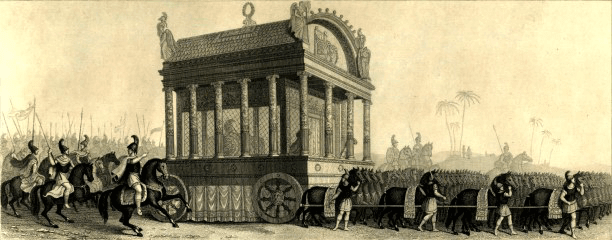
Alexander the Great Funeral Procession
Sources
Primary Sources
Secondary Sources
International Science Times (2014) Alexander The Great Could Have Died From Toxic Wine; Ancient Ruler May Have Been Poisoned By Little White Flower.
Warning: include(/home/humanityhistory/public_html/addons/domains/alexander-the-great.org/links/people-links.php): failed to open stream: No such file or directory in /home/humanityhistory/public_html/addons/domains/alexander-the-great.org/people/death-of-alexander-the-great.php on line 151
Warning: include(): Failed opening '/home/humanityhistory/public_html/addons/domains/alexander-the-great.org/links/people-links.php' for inclusion (include_path='.:/opt/cpanel/ea-php73/root/usr/share/pear') in /home/humanityhistory/public_html/addons/domains/alexander-the-great.org/people/death-of-alexander-the-great.php on line 151